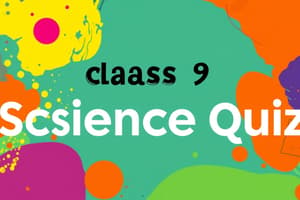Podcast
Questions and Answers
What is the likely focus of the Science Form 2 textbook based on its title?
What is the likely focus of the Science Form 2 textbook based on its title?
- Literature analysis
- Historical events
- Scientific principles and theories (correct)
- Mathematics concepts
Which resource is indicated as a digital format for accessing the Science Form 2 textbook?
Which resource is indicated as a digital format for accessing the Science Form 2 textbook?
- Flip PDF (correct)
- PDF file only
- Audio recording
- Printed version
What can be inferred about the value of taking notes during a lecture?
What can be inferred about the value of taking notes during a lecture?
- It helps in retaining information better. (correct)
- Only visual learners benefit from taking notes.
- It is a waste of time and resources.
- Notes are only useful for revising just before exams.
What is the publication date indicated in the document?
What is the publication date indicated in the document?
Which study method is generally considered ineffective?
Which study method is generally considered ineffective?
Which aspect is essential for effective group study sessions?
Which aspect is essential for effective group study sessions?
What type of content does the document suggest is suitable for Form 2 students?
What type of content does the document suggest is suitable for Form 2 students?
What negative effect can multitasking have on studying?
What negative effect can multitasking have on studying?
What main benefit does a Flip PDF format provide for students?
What main benefit does a Flip PDF format provide for students?
Which factor is likely to improve concentration while studying?
Which factor is likely to improve concentration while studying?
Why would a student prefer a digital textbook like the one mentioned?
Why would a student prefer a digital textbook like the one mentioned?
What can one infer about the Science Form 2 textbook's content structure?
What can one infer about the Science Form 2 textbook's content structure?
Which statement about sleep and learning is accurate?
Which statement about sleep and learning is accurate?
What audience is the Science Form 2 textbook primarily intended for?
What audience is the Science Form 2 textbook primarily intended for?
What is a common misconception about visual learning?
What is a common misconception about visual learning?
What strategy enhances understanding of complex subjects?
What strategy enhances understanding of complex subjects?
Flashcards
Scientific Method
Scientific Method
A systematic approach used in scientific study, involving observation, hypothesis, experimentation, and conclusion.
Matter
Matter
Anything that has mass and occupies space. The basic building block consists of atoms and molecules.
Physical Properties
Physical Properties
Characteristics that can be observed or measured without changing the substance's chemical identity (e.g., color, density).
Chemical Properties
Chemical Properties
Signup and view all the flashcards
Solid
Solid
Signup and view all the flashcards
Liquid
Liquid
Signup and view all the flashcards
Gas
Gas
Signup and view all the flashcards
Melting
Melting
Signup and view all the flashcards
Freezing
Freezing
Signup and view all the flashcards
Evaporation
Evaporation
Signup and view all the flashcards
Condensation
Condensation
Signup and view all the flashcards
Elements
Elements
Signup and view all the flashcards
Compounds
Compounds
Signup and view all the flashcards
Ecosystem
Ecosystem
Signup and view all the flashcards
Food Chain
Food Chain
Signup and view all the flashcards
Forces
Forces
Signup and view all the flashcards
Study Notes
- No specific content available from the links provided; focus on key concepts in a typical Science Form 2 curriculum.
Common Topics in Form 2 Science
- Scientific Method: Steps include observation, hypothesis formation, experimentation, and conclusion.
- Matter: Defined as anything that has mass and occupies space. Consists of atoms and molecules.
Properties of Matter
- Physical Properties: Characteristics observable without changing substance (e.g., color, density, melting point).
- Chemical Properties: Describe how a substance reacts with other materials (e.g., flammability, reactivity).
States of Matter
- Solid: Definite shape and volume; particles closely packed and vibrate in place.
- Liquid: Definite volume but no definite shape; particles are close but can move past one another.
- Gas: No definite shape or volume; particles are far apart and move freely.
Changes in States of Matter
- Melting: Solid to liquid; occurs at the melting point.
- Freezing: Liquid to solid; occurs at the freezing point.
- Evaporation: Liquid to gas; takes place at any temperature below boiling point.
- Condensation: Gas to liquid; occurs when gas cools and particles slow down.
Elements and Compounds
- Elements: Pure substances that cannot be broken down; made of only one type of atom (e.g., oxygen, hydrogen).
- Compounds: Substances formed by chemically combining two or more elements (e.g., water = H2O).
Classification of Living Organisms
- Five Kingdoms: Monera, Protista, Fungi, Plantae, Animalia; categorized based on characteristics like cellular structure and nutrition.
Ecosystems and Environment
- Ecosystem: Community of living organisms interacting with their environment.
- Food Chains: Show how energy is transferred through different organisms; starts from producers (plants) to various consumers (herbivores, carnivores).
Human Body Systems
- Circulatory System: Composed of the heart, blood, and blood vessels; responsible for transporting nutrients and oxygen.
- Respiratory System: Involves lungs and airways; enables gas exchange (oxygen inhalation and carbon dioxide exhalation).
Basic Principles of Physics
- Forces: Any interaction that changes the motion of an object; includes friction, gravity, and tension.
- Energy: The capacity to do work; exists in various forms such as kinetic, potential, thermal, and chemical.
Importance of Science Education
- Encourages critical thinking and problem-solving skills.
- Enhances understanding of the natural world and technological advances.
These topics provide foundational knowledge crucial for Form 2 Science studies.
Studying That Suits You
Use AI to generate personalized quizzes and flashcards to suit your learning preferences.




